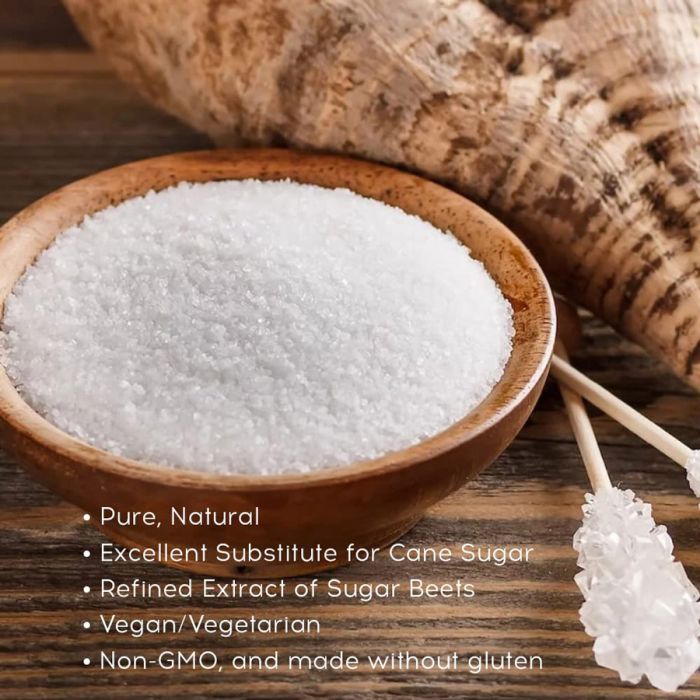Checking Out the Differences in operation and Advantages Between Beet Sugar Vs Cane Sugar
In the cooking world, the selection in between beet sugar and cane sugar is not simply concerning sweetness yet entails a nuanced factor to consider of taste, application, and impact. While both sugars stem from various plants, each goes through distinct manufacturing processes that discreetly affect their characteristics and suitability for numerous meals.
Origins and Production Procedures of Beet and Cane Sugar

Cane sugar, on the various other hand, comes from the sugarcane plant, a tropical turf belonging to Southeast Asia and now grown in tropical areas worldwide. The production of cane sugar starts with the harvesting of cane stalks, which are squashed to release the juice. This juice is after that steamed to focus it, after which it is spun in centrifuges to produce raw sugar crystals. These crystals are more improved to create the white sugar frequently readily available in stores.

Nutritional Material and Health Considerations

When comparing the dietary content of beet sugar and cane sugar, it ends up being evident that both kinds basically offer the very same calorie worths, with about 16 calories per teaspoon and no substantial nutrient variety. Each is made up almost completely of sucrose, which is a straightforward carbohydrate that uses quick power but does not have vitamins, minerals, or fiber. This similarity reaches their effect on health, especially worrying blood glucose levels. Both sugars, when consumed over, can add to elevated blood sugar levels, a risk element for diabetes mellitus and other metabolic disorders. Moreover, too much intake can bring about weight gain and dental issues, as both sugars are similarly cariogenic, advertising dental caries. From a health perspective, moderating intake of any kind of type of sugar, whether from beet or cane, is a good idea to avoid these possible unfavorable impacts on well-being. Thus, neither read holds a distinctive benefit over the various other in regards to health advantages.
Taste Profiles and Culinary Applications
Despite their similar chemical frameworks, beet sugar and cane sugar vary subtly in flavor, which can influence their use in numerous cooking contexts. Walking cane sugar commonly lugs a tip of molasses, also in its polished kind, lending a warm, caramel-like touch that improves baked products, coffee, and chocolate-based recipes. On the other hand, beet sugar is characterized by its very improved, neutral preference, Clicking Here making it a versatile sweetener that does not change the flavor accounts of dishes.
Ecological Effect and Sustainability
While both beet and cane sugars are derived from plants, their ecological effects differ dramatically as a result of the unique methods of cultivation and processing required for every. Sugar beet cultivation frequently entails extensive mechanization, which can increase nonrenewable fuel source usage and carbon discharges. Nevertheless, beetroots can be expanded in cooler environments and require much less irrigation, potentially lowering water usage compared to sugarcane. Sugarcane, on the other hand, is commonly grown in exotic regions where it depends greatly on irrigation and a much longer growing period, boosting its water impact.
Moreover, the processing of sugarcane often generates a substantial amount of waste, consisting of bagasse, which, although functional as biofuel, often adds to air pollution if melted inefficiently. Sugar beet processing makes use of more of the raw materials, resulting in much less waste. Both sectors face challenges in decreasing their environmental impacts, but ongoing advancements in farming practices visit homepage and waste monitoring are aiming to boost sustainability.
Economic Aspects Affecting the Sugar Sector
The financial characteristics of the sugar market are dramatically influenced by international market needs and trade policies. Variables such as tariffs, subsidies, and global profession agreements play critical functions in shaping the competitive landscape. In areas where sugarcane or sugar beet manufacturing is subsidized, manufacturers might have a monetary benefit that allows them to provide reduced prices on the international market. This can produce variations in success and market access for producers in nations without such subsidies.
Additionally, variations in global demand for sugar, affected by dietary trends and commercial use in food, directly impact costs and manufacturing degrees. beet sugar vs cane sugar. Climate condition likewise play a critical duty, as they can considerably influence plant returns and, as a result, the supply chain. This irregularity introduces a degree of economic unpredictability that can bring about financial investment volatility in sugar manufacturing fields, affecting choices from growing to market strategy
Verdict
In final thought, both beet and cane sugar have unique high qualities that fit various culinary needs. While cane sugar imparts an abundant flavor suitable for boosting baked goods, beet sugar's nonpartisanship is ideal for lighter meals.